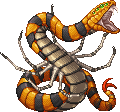Viewing 0svTg

Father: Unknown
Unknown Pedigree
Hardiness: 5
Appearance: 7
Emerged: 5:39 07.11.2024
Matured: 4:13 09.11.2024
Long brumation periods leave Inkuba Brulajos ravenous when they emerge from their underground dens. Agile on both the ground and in trees, these predators use their eight eyes and powerful sense of smell to locate and track prey. They have two hunting methods; the first, more passive technique is observed during the first few days following brumation as they rebuild their energy reserves. When passive hunting, an Inkuba Brulajo will hang motionless from a tree branch for hours until its quarry—a Floranta Doloro—drifts into reach. Using its long, slender legs, the Inkuba Brulajo will grab the medusa’s bell and pull it close in order to swallow the creature whole. Once an Inkuba Brulajo has regained its full strength, it switches to a more active hunting pattern and will stalk anything small enough to swallow, including Stranga Sciuros and Fluganta Ratos. As it strikes, it grabs the unfortunate creature with its legs, then wraps its muscular body around its prey to squeeze it to death. The mating season is brief, and females will find a tree in which to give birth, usually near a swarm of Floranta Doloros. Juveniles must fend for themselves once born and are capable of passive hunting within minutes of emerging.
The creatures that dwell in this rather desolate world still display some diversity in appearance, eating habits, and social behavior. Whether they have fur or feathers, skin or scales, their unique genetic makeup allows for a variety of colors and markings within each species. Despite limitations in food sources, herbivores, omnivores, and carnivores are all present in the food chain, and each species requires specialized care within a laboratory. Although the artificial setting of housing units and breeding pods precludes most opportunities to study true interspecific behavior, the interactions within and between species has been studied extensively in the wilderness by scientists daring enough to venture beyond the outpost’s walls.
